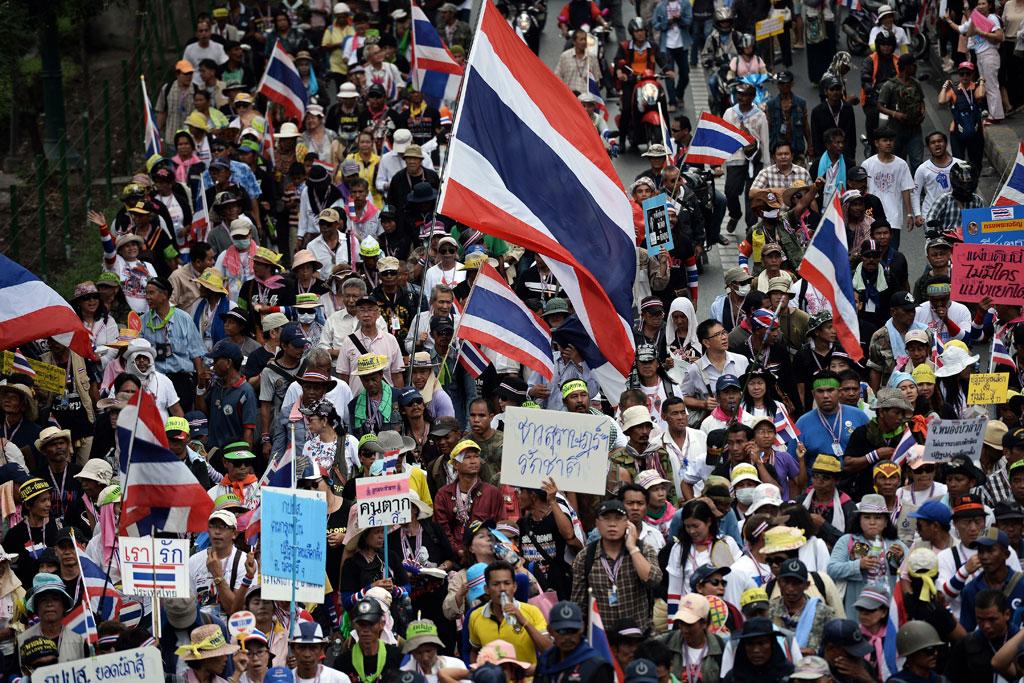To the polls again: Thailand will hold a new general election in July
Anti-government protesters wave national flags during a march in downtown Bangkok on March 25, 2014.
Thailand's prime minister and the country's Election Commission agreed on Wednesday to hold an election in July despite the opposition's reluctance to say whether it will take part after boycotting a February poll that was later annulled.
Anti-government protesters have vowed to disrupt any election, as they did in February as part of a six-month campaign to oust Prime Minister Yingluck, raising questions over whether the polls will go ahead smoothly.
"The prime minister and the Election Commission agree on a July 20 election," Puchong Nutrawong, secretary-general of the commission told reporters.
He said the commission would ask the government to issue a royal decree and get the king's endorsement for the vote. The cabinet, which must also sign off on an election, would likely consider the decree next week, he said.
Thailand has been in crisis since November, with sometimes violent street protests and legal challenges to Yingluck, who risks being removed by the courts next month.
A court nullified February's election because of rules that stipulate the vote must be held on the same day across the country. Voting was not held in 28 southern constituencies because candidates were stopped from registering.
Anti-government protest leader Suthep Thaugsuban has shown no sign of giving in, even though the number of demonstrators has dwindled considerably.
"We are approaching D-day, the details of which will be revealed tomorrow. This will be our final uprising, our ultimate gathering," Suthep told supporters on Tuesday.
Offers by opposition leader Abhisit Vejjajiva to mediate in the crisis have met with skepticism. He has called for talks and for a political reform process to take place alongside a general election.
"I will outline a way out for Thailand and put it to the public. This will take one or two days," Abhisit said on Wednesday.
"I will send the proposal to Yingluck and Suthep … If the public accepts the proposal it will be our exit strategy but if it does not, each side must continue their own way."
He has declined to comment on whether his Democrat Party will take part in a July vote.
The crisis broadly pits Bangkok's middle class and royalist establishment against the mainly poor, rural supporters of Yingluck and her brother, ousted former premier Thaksin Shinawatra, who lives in self-imposed exile abroad.
Protesters accuse Thaksin, who was ousted in a 2006 coup, of corruption while in office and of harboring republican sympathies, accusations he denies.
"Red shirt" supporters of Thaksin and Yingluck have vowed to defend the caretaker premier if she is removed and they plan a large rally on the outskirts of Bangkok on May 6 ahead of legal decisions that could see Yingluck forced from office.
Thaksin or his loyalists have own every election since 2001 and the former telecoms tycoon still retains huge support, especially in the rural north and northeast and among the urban poor.
(Additional reporting Aukkarapon Niyomyat and Panarat Thepgumpanat; Editing by Alan Raybould and Robert Birsel)
Every day, reporters and producers at The World are hard at work bringing you human-centered news from across the globe. But we can’t do it without you. We need your support to ensure we can continue this work for another year.
Make a gift today, and you’ll help us unlock a matching gift of $67,000!
